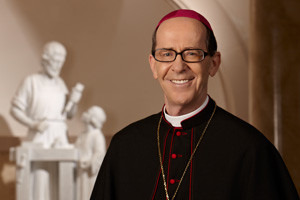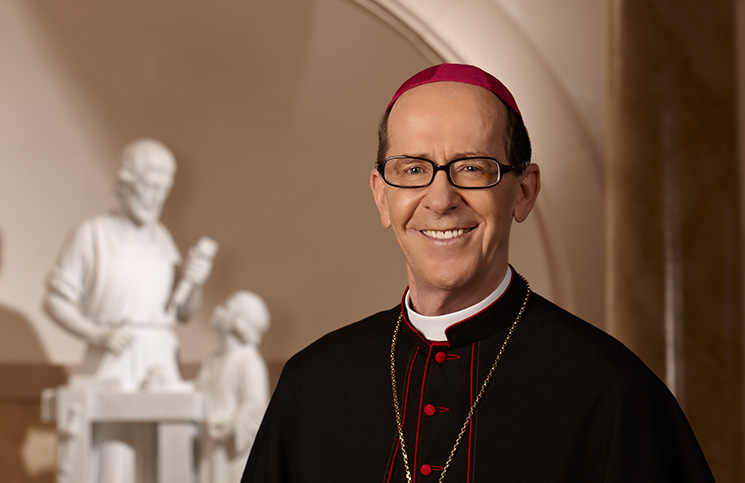In recent issues of The Catholic Sun, we looked at the first five of eight tasks Catholics need to be about in order effectively to bear witness to Christ at this time in America. These included the following: trust the truth; live God’s plan for marriage; be pure of heart; make Sunday the center of our life; and defend the dignity of all persons. Today, we shall present two more: Promote the common good through charity, and be merciful but fearless.

6. Promote the common good through charity.
The common good is built by means of charity. While it is true that the government has a role to play in this endeavor, it is incapable of bringing about human flourishing on its own, since it cannot move people to act with charity. Blessed Mother Teresa of Calcutta had a keen awareness of charity’s irreplaceable role in overcoming poverty and securing integral human development. That is why she insisted that she and her Sisters were not social workers; they were and are Missionaries of Charity.
The Church in America makes an irreplaceable contribution to our nation when it practices truth-filled charity, charity in truth, through her members who have put on the mind and heart of Christ. True charity involves both love of God and neighbor, and it inspires in those who observe and receive true charity a life of self-giving. If we do not act with this kind of charity, we are certainly not doing the will of God.
The opposite of charity is indifference. When the poor are neglected, the real reason is not merely because government programs were insufficient, as so many are inclined to believe; the problem is actually much more profound, the solution much more costly than lobbying the government for a greater portion of tax revenue. In fact, an over-reliance on government programs as the primary solution in dealing with poverty can create an entitlement mentality that leads away from the true meaning of charity and even an authentic concern for the poor.
Neglect of the poor and disregard for the most vulnerable primarily arise from lethargy of the heart. We must do what we can to avoid such neglect and to overcome any such indifference through a spiritual and moral conversion that encounters the living Christ and ignites and sustains our souls. Jesus said (Luke 12:49), “I have come to set the earth on fire.” That fire is called charity, the love of God that comes to us through Christ. It is a fire that burns away the chaff of indifference and then moves us to put our faith into action.
We cannot overcome social and spiritual inertia without the grace of God. This is why Benedict XVI wrote (Caritas in Veritate, #79), “Development needs Christians with their arms raised towards God in prayer, Christians moved by the knowledge that truth-filled love, caritas in veritate, from which authentic development proceeds, is not produced by us, but given to us.” Charity is possible only when selfishness is overcome by the grace of God, and we are freed by Christ to love as He first loves us.
No practical step toward charity in truth could have more impact on us than time spent with Jesus in adoration of the Blessed Sacrament. Blessed Mother Teresa said it beautifully:“Each one of us is a co-worker of Christ — we must labor hard to carry Him to the hearts where He has not yet been known and loved… But, unless we have Jesus, we cannot give Him; that is why we need the Eucharist. Spend as much time as possible in front of the Blessed Sacrament and He will fill you with His strength and His power.”
7. Be merciful yet fearless.
The Church, for many centuries, has urged people to practice the spiritual and corporal works of mercy. There are seven of each. The Corporal Works of Mercy are as follows: feed the hungry, give drink to the thirsty, clothe the naked, visit those in prison, shelter the homeless, visit the sick and bury the dead.
The Spiritual Works of Mercy are as follows: admonish the sinner, instruct the ignorant, counsel the doubtful, comfort the sorrowful, bear wrongs patiently, forgive all injuries and pray for the living and the dead. These works of mercy are a hidden glue holding together not only our Church in the world but our nation itself.
How impoverished our nation would be were these works of mercy not to take place every day. For they go far beyond the strict requirements of justice. Justice, necessary as it is in our interpersonal relations, requires something more to be complete. As Blessed John Paul II wrote in Dives in Misericordia (#12), “The experience of the past and of our own time demonstrates that justice alone is not enough, that it can even lead to the negation and destruction of itself, if that deeper power, which is love, is not allowed to shape human life in its various dimensions.”
All the works of mercy, especially the spiritual ones, have an inherent reciprocal quality about them. Both the giver and receiver of mercy “receive” in the exchange. It is crucial to understand that the one who acts in mercy does not stand over or above the recipient of those acts. An attitude of condescension has no place with mercy. Rather, a fraternal bond between people grows through the thoughtful interchange of mercy. Pope John Paul II emphasized this bilateral quality in his encyclical on mercy (#14), “An act of merciful love is only really such when we are deeply convinced at the moment that we perform it that we are at the same time receiving mercy from the people who are accepting it from us.”
The practice of mercy usually begins at home and among our friends. In this regard, Blessed John Paul II again wrote (Ibid), “…merciful love is supremely indispensable between those who are closest to one another: between husbands and wives, between parents and children, between friends.”
Because mercy’s source is the Blood of Christ which washes over the world from the Cross, acts of mercy must not be mistaken as weak, timid or ineffective, as the secularist society might be prone to do. To the contrary, a merciful heart is one fortified with courage, ready to withstand severe testing and opposition. At this time our nation desperately needs Catholics living fearless mercy — living charity in truth; speaking truth in love. Only a nation with citizens who act mercifully will be able to promote peace that can endure.
In the final segment of this series, I will reflect upon our important call to evangelize through beauty.






![[VIDEO] Make Sunday feel like Sunday again](https://www.catholicsun.org/wp-content/uploads/2021/04/2021-YOUTUBE-BISHOP-MESSAGE-THUMBNAIL-ENGLISH-218x150.png)
